This week I’m fortunate enough to be speaking about blog SEO at the Design Blogger Conference in Atlanta, Georgia. When I was asked to speak at the conference, I was actually kind of surprised that they were looking for someone to cover the topic. In my experience, a lot of bloggers, and people in general really, have a bit of a negative view of SEO. While the SEO industry has certainly earned its reputation over the years, it seems that lately opinions are moving in a more positive direction. I think this is awesome because I know SEO can really help bloggers. Ranking well in organic search is one of the best ways to share your voice with a larger audience and increase your authority on a given topic.
My goal here is to help bloggers understand that SEO is simply a tool, not the mystical black art that many have sold it to be. When you do SEO right, it really doesn’t need to impact your writing much at all. Once you learn the basics, it just sort of becomes something you do naturally without having to think about it very much. In my experience, the places where most bloggers struggle are keyword targeting, strategic link-building, and technical SEO. When I say technical SEO, I mean indexation problems, meta issues, and most of the other things that our SEO audits address.
None of these things should change the way you write significantly. Keyword targeting can be as simple as doing a bit of research to make sure you mention the right words a few times throughout your posts. Technical SEO sounds complicated, and can be sometimes, but if you’re a blogger using WordPress, chances are it’s actually a lot simpler than you think. Strategic link-building can be a bit tricky, but as a blogger you have a distinct advantage over other website owners in this area. We’ll talk more about that in a bit. First, let’s talk about one of my favorite topics: WordPress!
Here’s the Sections of My Talk on Blog SEO:
- Power Your Blog With WordPress
- Integrate Basic SEO Into Your Blogging
- Participate in Your Community
- Keep Track of Your Progress
- Rinse and Repeat
Power Your Blog With WordPress
Alright, so I’m probably a bit biased on this topic since we run a WordPress support company, but the facts don’t lie. WordPress now powers over 20% of the Web. It is by far the most widely-used content management system and it continues to grow in popularity every year. I should probably clarify that when I say WordPress, I’m talking about the self-hosted version, not WordPress.com. WordPress.com is a great place to get started, but if you’re serious about blogging and SEO you should definitely consider self-hosting. You can learn about the differences between the two flavors of WordPress here.
In addition to being popular, WordPress is also the most SEO-friendly CMS I’ve ever worked with. Without doing anything extra, simply using WordPress will improve your chances of ranking. This is because it has a lot of basic SEO functionality, such as pretty permalinks and contextual page titles, built right in. When you add and configure an SEO plugin like WordPress SEO by Yoast, you’ll have a ton of common on-site SEO problems taken care of before you even start optimizing your content.
Moving to WordPress is (Usually) Easy
There are a lot of importers for WordPress that let you move your content from other systems like Blogger and Tumblr built right in. There’s also a bunch of great plugins and an entire guide to help make the transition to WordPress easier. One area that might be a bit of a challenge is choosing a new design for your site once you’re up and running. Lucky, there are tons of great free and premium WordPress themes for you to choose from.
If you’re not comfortable doing all this yourself, we will be happy to get moved over. Just give us a shout and we’ll get your blog migrated to WordPress so you can start enjoying the benefits of using the most SEO-friendly CMS on the market.
Integrate Basic SEO Into Your Blogging
Once you’ve got your blog running on WordPress, you need to start thinking about integrating some basic SEO best practices into your blogging workflow. In my opinion, the best place to start making some changes is in your keyword targeting. One of the main reasons we recommend Yoast’s WordPress SEO plugin is because it gives you real, easy-to-understand feedback on how well you’ve optimized your posts.
Over time, you’ll start naturally writing your posts in a more search-friendly format, but when you’re getting started it’s best to do these things AFTER you’ve finished writing. When SEO isn’t familiar to you, focusing on it right of the gate will just slow down your writing and frustrate you. Try to put it out of your mind until you’re done writing and think of it more as part of your editing workflow.
Assuming you’ve got a post written, let’s take a look at the feedback Yoast is giving us for this post so you can get an idea of how to SEO a blog post:
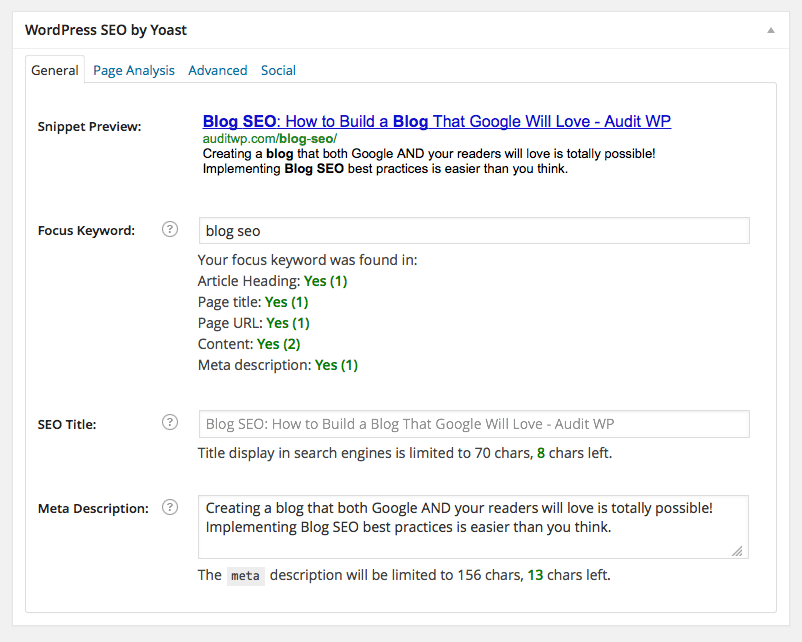
This meta box is where you will get feedback on the way you’ve written your post. The first thing you need to do on this screen is to choose a focus keyword for your post. All your posts should have a SINGLE focus keyword. It’s fine, and recommended, to mention related keywords throughout your post, but you should only focus on one primary keyword in each post.
To get started, all you need to do is enter your primary keyword phrase into the “focus keyword” box and the plugin will begin evaluating your post to see how well you’ve optimized it. You want to see as much green as possible.
Here’s how we got the SEO feedback you see in the image above:
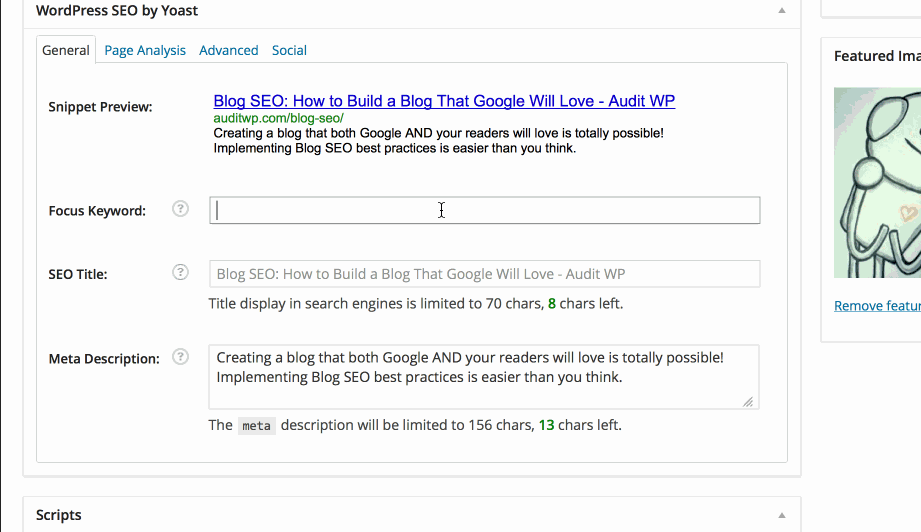
Pretty simple, right? If you’re seeing red or yellow, you’ve still got some work to do. Make sure you’ve mentioned your focus keyword in your URL, page title, SEO title, and your meta description.
Generally speaking, you want your focus keyword to be as close to the front of your page and SEO title as possible. That said, don’t compromise the title’s readability just for the sake of keyword targeting. Use your best judgment. If it looks or reads strangely, don’t do it. Always put your readers first.
Be Careful When Updating an Old Post’s URL
If you’re updating an old post, be very careful when changing the URL. If you decide to change the URL to make it more SEO-friendly, you’re going to need to create a 301 redirect for the original URL. If you don’t do this, any links you have pointed at your old URL will be lost.
There are a lot of different ways to create 301 redirects, in fact, there’s even a method for doing it inside of Yoast’s plugin, but it’s a little awkward to set up. The easiest way that I can think of is to use the Safe Redirect Manager plugin. It’s pretty easy to set up and the plugin has decent instructions as well. If you have any trouble getting it working, let me know in the comments and I’ll try my best to help you out.
Protip: Compelling Headlines Matter!
You should also keep in mind that your SEO title and your meta description are going to be the way people see your post in the Google search results. Because of this, they need to be attention-grabbing. Getting this right is critical for convincing people to click on your post. A great title can even outdo a higher ranking in some cases, so definitely spend some time thinking about improving your headlines. Our friends over at Copyblogger have some amazing tips on creating a compelling headline. Make sure you read this one and this one as well. I also recently came across this guide from Written on copywriting formulas, so definitely check it out as well.
Alright, back to SEOing your blog post… Once you’ve got a great headline and some green on your screen, you’re going to want to do one more thing to make sure you’ve really done a good job optimizing your post. You’ve probably noticed there are some tabs on the top of the WordPress SEO meta box. The one you need to pay the most attention to is Page Analysis. This is where you’ll get the most valuable feedback on your post. Click the Page Analysis tab and you should see something like this:
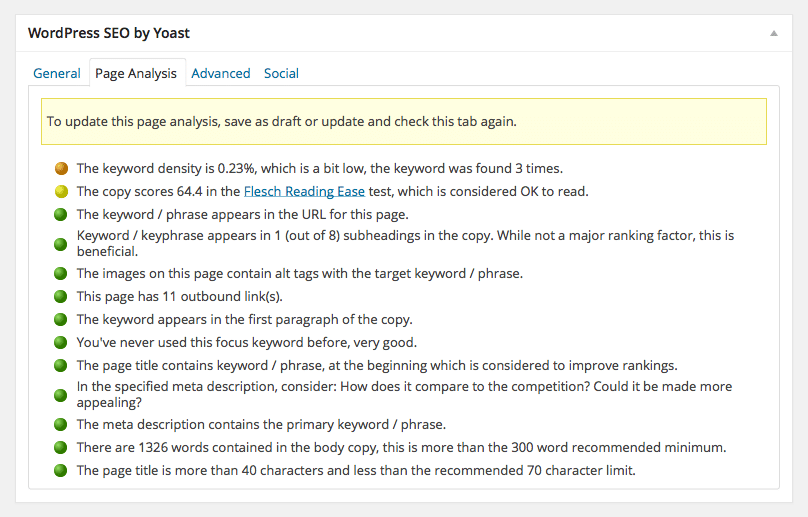
You want to see something close to this. Getting 100% green isn’t a requirement, you just want to make sure you’re getting rid of as much red as possible. If you’ve got a bunch of red and yellow lights on your post, go through and keep editing until you see plenty of green. In order to get an updated analysis, you’ll need to save/update your post and check the tab again.
In my case, it looks like I’ve done a pretty decent job optimizing this post already. One thing I should probably do is spend some time making this post easier to read. A great way to do this is to use a tool called Hemingway. To use Hemingway, just copy and paste your post’s content into the editor and use the visual feedback to edit it until it’s more readable.
Once you’ve done this, you’ve more or less learned how to optimize a blog post for SEO. There is one question that I’ve been asked quite a few times after demonstrating this process though…
How Do You Know Which Keyword to Choose?
Choosing the right keywords for your posts is another area where most people struggle. Many times the title of your posts might not be exactly what people are looking for on Google. As you do this more, you’ll start to develop a bit of a 6th sense for choosing keywords, but starting out it can be a little tricky.
Don’t let this section intimidate you or stop you from optimizing your posts. Really, even if you haven’t chosen the “perfect” keyword, if you go through the process above you’ll be in a much better place than you would be if you never optimized your content at all. Google is pretty smart and they’re getting smarter all the time. If your content is good enough, they’ll frequently rank you for the keyword you should have targeted if it isn’t something that’s super competitive.
That said, in a perfect world, you’d always be optimizing your content for the ideal keywords. In order to get a little closer to that, you can use a few tools to get an idea of what people are searching for on Google. You probably noticed in the animation above that Yoast’s meta box was suggesting keywords to choose as I was typing. This is very similar to how Google’s own search box works and it’s the first step in picking a good keyword. You could simply grab a keyword from this list and hope for the best, but if you really want to get the most out of your content you need to go a little farther.
Keyword Research is Hard, but Worth the Effort
In order to pick the best keywords, you need to do a little research. There’s a tool from Google called the Keyword Planner that will let you see how many people are searching for a particular group of keywords. The problem is it’s difficult to come up with variations on your original idea to see what might work best. Luckily, there’s a simple tool called Ubersuggest that can give you a ton of ideas to test in the Keyword Planner. Here’s a guide on how to use Ubersuggest.
Spending 5 or 10 minutes doing this can mean the difference between targeting a high competition, low volume keyword or targeting a low competition, high volume keyword. It’s hard to get into the habit of doing this, but if you take the time to learn it, you’ll understand the benefits pretty quickly.
Google also has another useful tool called Google Trends which lets you see the overall interest in a keyword or a topic over a period of time. This can be a good indicator of whether a keyword or a topic is worth focusing on. Keyword research is a pretty vast topic and it’s also one of the cornerstones of SEO. Don’t feel bad if you have trouble with it, you are far from being alone. Just chip away at understanding it a little at a time.
This Isn’t the Only Guide to Help with Your Blog’s SEO
There have been some really fantastic guides written on SEO for bloggers in the past. You should definitely give them a read as well because they go more in-depth on some topics that fall outside the scope of my talk and this post. Some of my favorite posts on Blog SEO include:
- SEO 101 for Travel Bloggers
- The Blogger’s Guide to SEO
- 21 Tactics to Increase Blog Traffic
- Moz Beginners Guide to SEO
We’re also going to be adding some more content to our blog to expand on some of this stuff in the future, so make sure you subscribe to receive updates!
The next thing that most bloggers struggle with is strategic link building. This isn’t a problem isolated to bloggers, even a lot of SEO professionals struggle with this concept. It’s not easy, but as a blogger, you’ve got an advantage because whether you know it or not, you’re part of a community.
Participate in Your Community

Like I mentioned before, being an active blogger gives you a number of distinct advantages over other website owners. As a blogger, you probably already have a group of people you interact with and talk to online on a regular basis. This is a huge advantage! Keep track of where these people are hanging out on the web.
Personally, I’m a member of the WordPress community. Most of my friends hang out on Twitter and share content on their own blogs as well as a handful of news and tutorial websites. In order to keep in touch with all of my WordPress homies, I stay active on Twitter. I also leave blog comments whenever I have something worth saying, and I have a ton of people on my Skype list. All of these things mean that whenever I publish something related to WordPress, it’s pretty much guaranteed to get a lot of eyeballs and pull in a decent amount of links.
You need to do the same thing in your industry. There are a lot of ways to go about finding your people, but in my experience, the most direct method is to just use Google. Start searching for things related to your industry and see follow through the top results to find where everyone is hanging out. Find the popular blogs, see which social networks everyone is most active on, and pay particular attention to any forums your community is using.
Start leaving comments, talking on social channels, sharing your own content as well as the content of others, and posting in forums. Don’t spam anyone, but don’t be afraid to jump into the conversation either. Once you’ve established yourself in the community a little bit, don’t hesitate to start asking people for links when appropriate. Ask about guest posting opportunities and start surveying people for round-up style posts. If you’re a genuine person and you’re not just trying to leech off the community, you’ll be surprised how responsive and helpful everyone is.
Another great tool for finding like-minded bloggers is called Triberr. We actually interviewed the founder on our podcast a month or two ago and he’s pretty cool. It’s a really useful tool and Dino, the guy who created it, is really passionate about connecting bloggers to one another. Definitely check it out.
The reason this community-driven link-building approach works so well is that it keeps the links you’re building very authoritative and very contextual. Google values both of these things highly. The types of links you want are editorial links placed within the body content of sites that have high authority in your industry. The more of these types of links you can drive to your site and your posts, the better they will perform in search.
There’s Lots of Ways to Build Links
In addition to working within your community, there are tons of other tactics out there for building links to your blog. My friend Jon Cooper has a really cool link-building tactics post that outlines a massive amount of strategies for you to implement to help improve your rankings. Give it a read, I’m sure you’ll find at least a handful that will work for you.
With all the SEO changes you’re making and the links you’re building, you’re going to need to start keeping better track of how well your efforts are working. Keeping an eye on what’s working and what isn’t can help you improve your blog SEO efforts in the future, so it’s important that you have at least a basic understanding of Google Analytics.
Keep Track of Your Progress
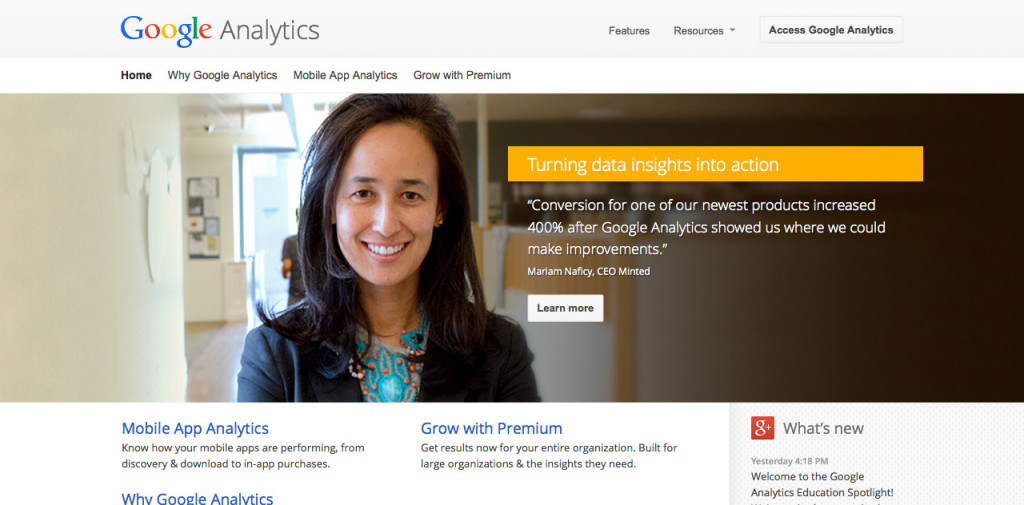
If you’re not already using Google Analytics, you really need to start. Analytics can get pretty complicated and probably deserves an entire post of its own. That said, there’s a number of simple things you can look for in your analytics to help you keep track of and improve your blog’s content and SEO efforts. First of all, you’ll need to set up and install Analytics if you haven’t already. This guide does a good job explaining how to set up analytics and you can use this plugin to add analytics to your blog.
Once you’ve done that, you’ll need to know what to look for in analytics to keep track of how well your SEO efforts are working. One thing that can be really helpful is to install a custom dashboard. Luckily, Yoast already has one that you can install. This dashboard shows you only the most important stuff to get some real insight into how your blog is performing. Here’s a post on how to configure and install it.
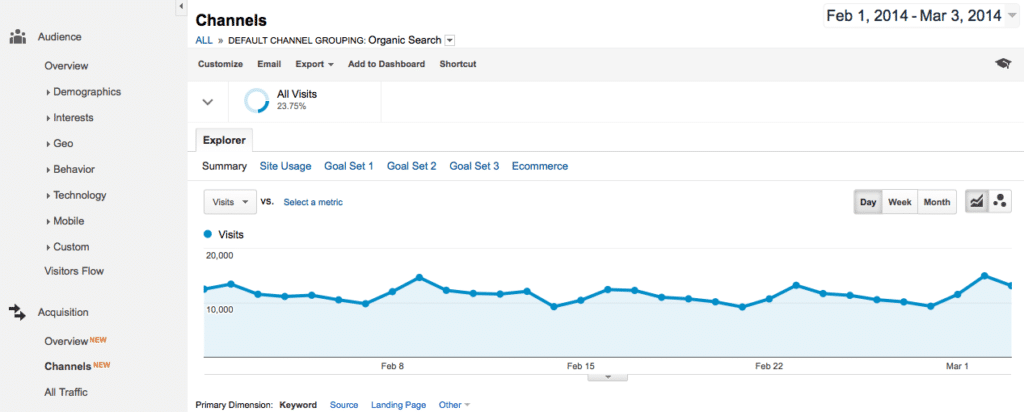
In addition to the custom dashboard, you’ll want to keep an eye on the Channels tab within Analytics. For tracking your SEO efforts, the Organic Search menu is the one you’ll want to watch. Another way to get a quick overview of how your site is performing is called WooRank. It connects to your Analytics profile and gives you a condensed report on how your site is doing.
Rinse and Repeat
One of the biggest mistakes people make is they give up too early. The things outlined in this post take time! You can’t just target a few keywords, send a couple of emails, and check analytics a few times if you want to succeed. You need to keep at it.
Don’t stop after you optimize a post or two. Do as many as you can! Go back into your old content and optimize it. Keep doing keyword research and learn how to anticipate what people will be searching for in your field. Keep your finger on the pulse of your community so you can be one step ahead of everyone and create content that people are thirsting for. You can do it! It’s not as hard as it seems, just keep working all the time, and eventually, you’ll get there.
I hope this post and my talk were helpful. If you have any questions about anything in the post, please leave them in the comments and I’ll do my best to answer them. If you’re reading this at the Design Bloggers Conference during or after my talk, come talk to me about it! I’ll be happy to answer any questions you might have. 🙂




77 responses to “Blog SEO – How to Build a Blog That Google Will Love”
Thanks for preparing all this great information from your talk today. Appreciate the chance to review it all when I get home. Preparing to switch from blogspot to WordPress so your talk was of particular interest!
Thanks for the comment Jill! I’m glad you found the information useful. If you have any questions about it, please don’t hesitate to ask. 🙂
Exceptional post and you make clear the right method of build a Google friendly Blog. Your blog is ready to lend a hand for Guest blogging. WordPress has become a suitable tool to build a good blog and every person can easily handle it because it is so users friendly.
Hey great article, Really informative one, this will help me a lot. Thanks for sharing it.
Hey Robert, great information shared in this article. I never noticed these many things are there in Blog
Thanks to share this post.
An amaizing consultancy on seo
I thinks you validate everything from google suggest as: pagespeed site, validate html, site not flash, allow google bot, intergrated google webmaster tools and google analytics
Great article. Thanks for the information. This kind of to do list is just what I needed
Our pleasure, Lior. Glad it was helpful!
Very interesting article and also informative. I learned a great deal from it . Thank you for all the ideas.
Hi,
Your all ideas are great.It is very helpful and informative for me and anyone.Many many thanks for share it.
Nice Post. I think social activities and performance also matter somewhere in search results. Drafting and publishing new Blog Post doesn’t finish your job – you need to make it visible to people who are looking for these kind of stuff. Sharing it and making other people sharing it will result in more views and clicks on it and good user experience will improve your search as well.
The post is very informative and very helpful for newbies in SEO industry and Thank you So Much for sharing great piece of content in public!
! I love to improve in SEO all the time especially when I see changes in my site´s rank. I will try to implement some of these tips.
Are you going to create for another blog regarding on different style of link building strategies?
We probably won’t, Nomar, but this is a really comprehensive guide if you’re looking for tips: http://pointblankseo.com/link-building-strategies
Thank you for this post. Very informative and I finally know how to use Yoast. The YouTube videos made for this is very boring, long, and very hard to understand, but you explained this so easily and I got this in a few minutes. Good job!
Wow.! Nice Tips
Hey this is really very informative.
Thank you for this post- super helpful info! I’m new to blogging and have much to learn. I’d been considering using Yoast. Do you recommend I go with the paid version or is the free version okay for a newbie like me?
Hey Dawn, the free version is definitely fine if you’re just getting started! The main benefit of the premium version is the redirect tool that it includes, which shouldn’t really be needed by you at all. Thanks for stopping by 🙂
Thank you for a very straight forward, informative article with helpful links included. Although I already know the basics of SEO, you’ve outlined everything in a simple descriptive manor.
This sounds great, i found lot of informative tactics to create quality blog with seo friendly. I think this information will be helpful for even to create SEO friendly websites. Thank you for sharing such a nice post about SEO tips.
A very good and informative article. I found the information about the redirect and Safe Redirect Manager plugin very useful. Thank you very much for sharing.
This is exactly the kind of article I was looking for. Great stuff…you cover so many great points…thanks so much.
P.S. I tried to follow the link to Dashfolio, but couldn’t get to the page. I searched around, and it looks like they shut down awhile back (unfortunately). Do you know of any similar resource we could try? It sounds like a cool thing.
Thanks so much for sharing. Your points are spot on especially our sites besides doing keyword research we really need to do on-page and off-page seo. 🙂
Love this Article, this is what exactly I was looking at, for blog SEO I have accidentally landed another Article as well I will provide that link here for more information, now after start reading both I got a lots of Insight how to optimize my clients blog content. Thank you so much Mr. Rob Neu.
Regards,
Manish
Awesome! I think social signal and social engagement also matter for ranking in the search engine. SEO is a long time and never ending process that you can never stop. So people should focus on social media besides SEO. Social share can increase the traffic and engagement that can be helpful to ranking as well. Your post is ideal for SEO learner and blogger. I think every SEO learner and blogger should read this post. Your keyword research tips are excellent. I have enjoyed my reading, thanks!
Having problems improving the pageveiws of my blog, i get an average of 40 to 20 page veiws. No free traffic from search engines. i have all the neccessary plugins, but still yet it doesnt help. and my blog has been around for sometime
Great article! I will follow you more closely. I have a question though. I am having a hard time finding specific information on integrating the website to the wordpress blog. I used godaddy wordpress management to integrate my website and blog and they gave me this address blog.website.com. I have noticed most other websites are integrated with their website with the http://www.website.com/blog address. My goal is for my website to gain as much credit and relevance with google, so am I hurting myself with godaddy with the blog.website.com address? Thank you for any thoughts!
Do you think that using the freebie http://www.domain.wordpress.com thwarts SEO v upgrading to a paid blog? Great article.
Yes.
What great insights you have given us–thank you rob neu!!
I am a beginning blogger and not well stocked with images. I do not want to plagiarize any photos. Where can I find free images to use? Where can I purchase images at reasonable prices?
Thank you for your encouragement and help!!
Thank you Sir for this SEO guide its very useful for me and I surely apply it for my blog
Yes publish fresh content each day is a big win in the SEO industry, especially easy for webmasters who don’t understand nothing at SEO 😉
I agree that people give up to easily and want quick results. Patience and hard work are important to be successful in anything in life.
Using wordpress and the Yoast plugin should be seo 101 for any website owner! It streamines all the important and adjustable optimization information while also making it easy for beginners to understand. Another big part of this is you mentioning that this TAKES TIME! So many people forget this and give up way too soon. I’ve waited up to 9 months to see results after making the necessary changes to my agency website, but I’m thankful I did and stayed on course. Thanks for all this.
Great article. A couple of gems in there like Google Trends, Hemingway and Ubersuggest. I’ve known about these tools but have seen few mentions of them elsewhere in the SEO world. Awesome suggestions.
Awesome article. Good backlinks used to be easy to acquire a few years ago. But, Google did a number on content farms where most bloggers used to get backlinks. There are few ways to get good backlinks these days.
Moving your blog from another host to WordPress is very easy, as I have done it twice in the past. Also, as a professional blogger, writer and editor, I am also happy to see that the opinion of SEO is improving, as long as you do it right. There is definitely a right and a wrong way to implement SEO into your professional website, and it’s important that you invest in a professional writing team so that your content is really high quality. It is well worth the investment and you’ll see a high ROI in terms of rankings and site visitors.
Very Impressive article. Nicely and deeply use of wordpress and SEO plugin in blog to generate traffic. I appreciate that.
Fantastic write-up, Bro! Really well done. I’m going to forward this article to a few of my clients.
great article full of information it give me a lot of knowledge thanks for sharing it with us
Thanks buddy for this, but is there way to get those plugins or tools on Blogger too?
Really Good article.provided a helpful information about OFF page SEO .keep updating…
As a learner of SEO, I think those are the major giant points about SEO On-page and Off-page SEO. Some points are really help me to opt out me from some confusions about SEO facts.
thankx a ton for such lovely tools
Blogging and working on yielding positive and good reviews helps to gain Online reputation through SEO.
Very well written article. I was struggling with optimization of the contents of my websites. But now I have the perfect solution to my struggle. I won’t be struggling anymore from now on.
Thanks a lot for sharing this article
thanks for this tips
Hey, nice blog very informative about the seo and on page and off page optimization.
Can you write a article on black hat and white hat seo
Very nice. I loved the way you explained it. I’ll keep these tips in mind. They are very useful and valuable.
Cheers!
Great work!
Thanks for the info.
https://i.imgflip.com/1uirbl.jpg
Thanks for all this information. I’ve been doing local seo for a lot of clients for a couple years and struggled with the link building concept. I feel my on page SEO is great but off page has always been my downfall. Thank you for clearing all this up with how to gain link properly without spamming or annoying the community.
Thanks for the info.
Thanks for sharing this great article with us. This article was very helpful for beginners keep sharing
Thank you for posting this informative blog on how to build a SEO friendly blog. I will keep these points in mind so that the Google bots can easily crawl my blog and help my blog get higher SERP. Please keep on sharing more helpful SEO related tips and suggestions in the upcoming posts.
Thanks for sharing the Usefull Information
As I am newbie, really tell you I got lots of help with this post, its very informational post, now its easy for me to rank my blog in Google
Thank
Thanks for sharing this blog. It covers every basic SEO points which will be useful for any individual thinking to start a blog.
This was a really helpful post. Thanks for taking the time to write it.
All of these things are a good start, but don’t forget the other much more important things, such as, you know, writing good content that people want to read, and acquiring links from authoritative sites in your niche. A good foundation is important, but so is what you actually build on that foundation. 🙂
You read the post, so I guess we delivered!
Thanks for sharing an article with us.very useful information
Does new blog content every week improves your blog’s SEO efforts?
Hey, nice article with lot’s of valuable info. The drawback with the Yoast SEO plugin is that is makes you pay for premium features you eventually want to use.
For site owners looking for a totally free alternative I would suggest a new, light-weight WordPress SEO plugin: Poor Man’s WordPress SEO (https://wordpress.org/plugins/poor-mans-wp-seo/). As the name suggest there are no paid features – the plugin is released under GPLv3 in the same way as WordPress is.
The plugin contains all the features a basic or more advanced WordPress site owner could ask for, and new ones are on the works. Cheers! 😉
Thank You For Sharing This Useful Information It is Very Useful For Me 🙂
This was a very useful information, it was really helpful for me. Thanks
An informative article indeed, teach ways how to build a successful blog that will rank in SEO. Thanks.
Thanx for sharing..Very helpful.
One of the most common problems that I hear from people looking to learn more about SEO is that they don’t know what information to trust.
This is probably one of the most comprehensive posts on SEO strategies. I am curious on how to focus SEO strategies per geographical regions. Most people want to target not just a specific niche, but also a specific region.
I think you validate everything from Google suggest as pagespeed site, validate html, site not flash, allow google bot, integrated google webmaster tools and google analytics. Drafting and publishing new Blog Post doesn’t finish your job – you need to make it visible to people who are looking for this kind of stuff. Sharing it and making other people sharing it will result in more views and clicks on it and good user experience will improve your search as well.
Very usefull!
Do you can recommend a tool like hammingway but for spanish language?
Exceptional post and you make clear the right method of build a Google friendly Blog. Your blog is ready to lend a hand for Guest blogging. WordPress has become a suitable tool to build a good blog and every person can easily handle it because it is so users friendly.